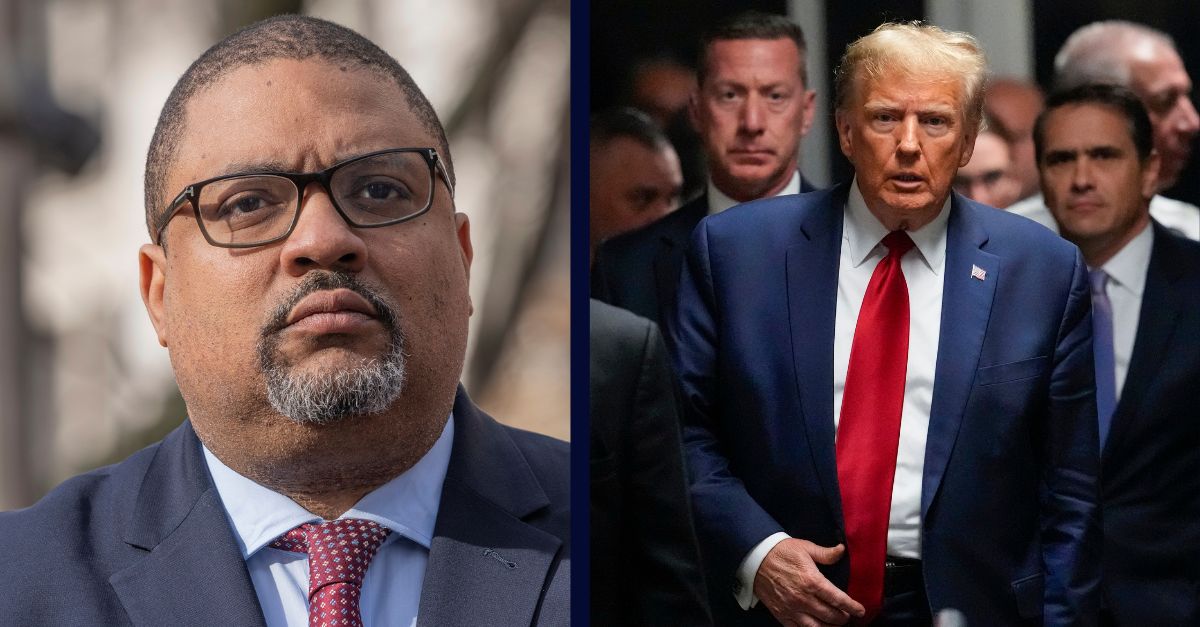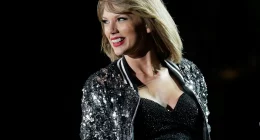
Left: Manhattan DA Alvin Bragg (Lev Radin/Sipa USA)(Sipa via AP Images); Right: Former President Donald Trump (AP Photo/Mary Altaffer)
Manhattan District Attorney Alvin Bragg, fresh off the historic first successful criminal prosecution of a former U.S. president, is aiming to keep his winning streak alive by maintaining the months-old gag order he requested, received, and later had expanded against Donald Trump. And he wants to keep Trump’s speech limited for quite awhile.
In a Monday letter, the 45th president’s lead attorney, Todd Blanche, argued his client “remains the leading candidate in the 2024 presidential election” and should be allowed the unfettered right to speak about the New York criminal case “because the trial has concluded” and “the stated bases for the gag order no longer exist.”
Bragg’s office disputed that characterization of what prompted the gag order in its own pre-motion response letter filed Tuesday.
The response focuses on the Trump motion invoking the conclusion of the trial itself as the justification for removing the gag order.
“The Court’s Orders, however, were not based only on the need to avoid threats to the fairness of the trial itself,” the filing reads.
Bragg’s office cites excerpts from the two iterations of the gag order — noting the court’s “obligation to prevent actual harm to the integrity of the proceedings,” as well as “the orderly administration” of the court, and to avoid “risk[s] to the administration of justice.”
After dispensing with the general terms of the orders, the six assistant district attorneys, in a parenthetical, remind Merchan of the specific language the judge used when tailoring the restrictions to Trump, citing what the court termed the defendant’s efforts to “interfere with the fair administration of justice,” to threaten “the integrity of judicial proceedings” and to “intimidate this Court.”
In early April, in response to a request from the district attorney’s office, Merchan expanded the earlier gag order in the hush-money case — expressly disallowing Trump from making public statements regarding “the family members of any counsel, staff member, the Court or the District Attorney.” That order came after a series of Truth Social attacks in which Trump went after Merchan’s daughter for her work as an in-demand Democratic Party political consultant.
Now, the defense says those orders are old hat because nothing Trump says about the New York trial — or presumably its participants — would have a “significant and imminent threat to the trial” or any impact on “the jury’s functioning,” citing language used by the government in their own gag order arguments.
Blanche also cites the court’s articulated concerns about “a juror,” “a witness,” and court personnel who worked on the trial “in some other capacity.” Those concerns, the defense notes, echoed the government’s specific mentions of “trial participants,” “trial witnesses,” and “prospective jurors.”
“The proffered justifications for the gag order, which we disagree with, related to the trial,” the defense says, in summary.
The prosecution, on the other hand, insists the gag order is more about the entirety of the criminal legal process in the case.
Such an understanding of the gag order’s longevity, would extend to sentencing, at least, Bragg’s motion agues. The prosecution also foresees the gag order potentially extending much longer in order to cover “the resolution of any post-trial motions.”
The district attorney’s office elides a series of constitutional and political concerns raised by the defense in its own letter.
Blanche elucidated those concerns, as follows, at length:
The constitutional mandate for unrestrained campaign advocacy by President Trump is even stronger in light of: (1) President Biden’s May 28 campaign event outside the courthouse during the defense summation; (2) President Biden’s public comments regarding the jury’s verdict on May 31; (3) continued public attacks against President Trump by government witnesses Michael Cohen and Stormy Daniels; and (4) the presidential debate scheduled for June 27, 2024.
Notably, neither side has actually filed their respective motions regarding the gag order — due to a late March court ruling.
After a raft of pretrial motions filed by the defense near the date of trial, New York County Supreme Court Justice Juan Merchan decided he had seen enough such motions and issued an order requiring all parties to seek leave from the court, by way of a one-page “pre motion” letter, before filing additional motions.
Trump was found to have violated the gag order, held in contempt, and fined for 10 separate violations over the course of the trial.
Have a tip we should know? [email protected]









